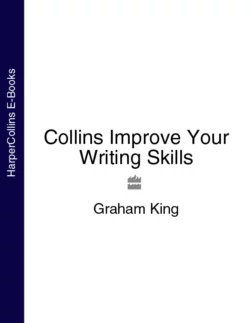Collins Improve Your Writing Skills

Graham King
Тип: электронная книга
Жанр: Справочная литература
Язык: на английском языке
Стоимость: 463.81 ₽
Статус: В продаже
Издательство: HarperCollins
Дата публикации: 16.04.2024
Отзывы: Пока нет Добавить отзыв
О книге: The essential guide to writing English, this book will help you to develop your written communication skills and to use language to express yourself clearly and correctly.Can you learn how to improve your writing skills? Can the art of good writing be taught? Despite what you might feel, the answer is yes – you can be taught. Everyone is capable of enhancing their powers of written communication simply by learning and practising the basic principles of clear, concise and coherent writing: planning, preparation, and revision. Using this book, your confidence will grow as you begin to appreciate that the English language is not a fearsome book of rules but an unrivalled communications tool that you can learn to use with the familiar ease of a knife and fork. The basic principle of this incredibly useful book is that ‘clarity begins at home’: say what you mean and you stand a better chance of getting what you want!